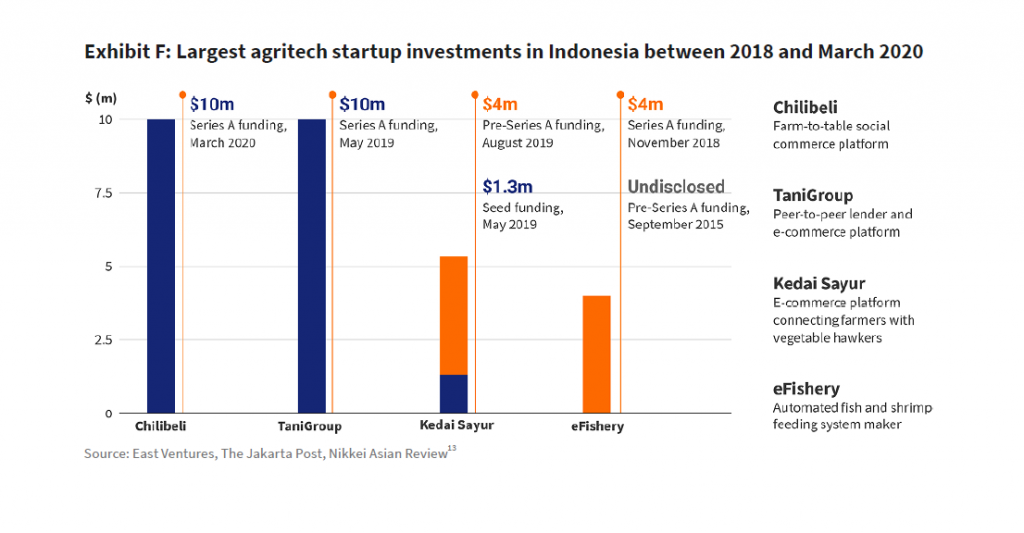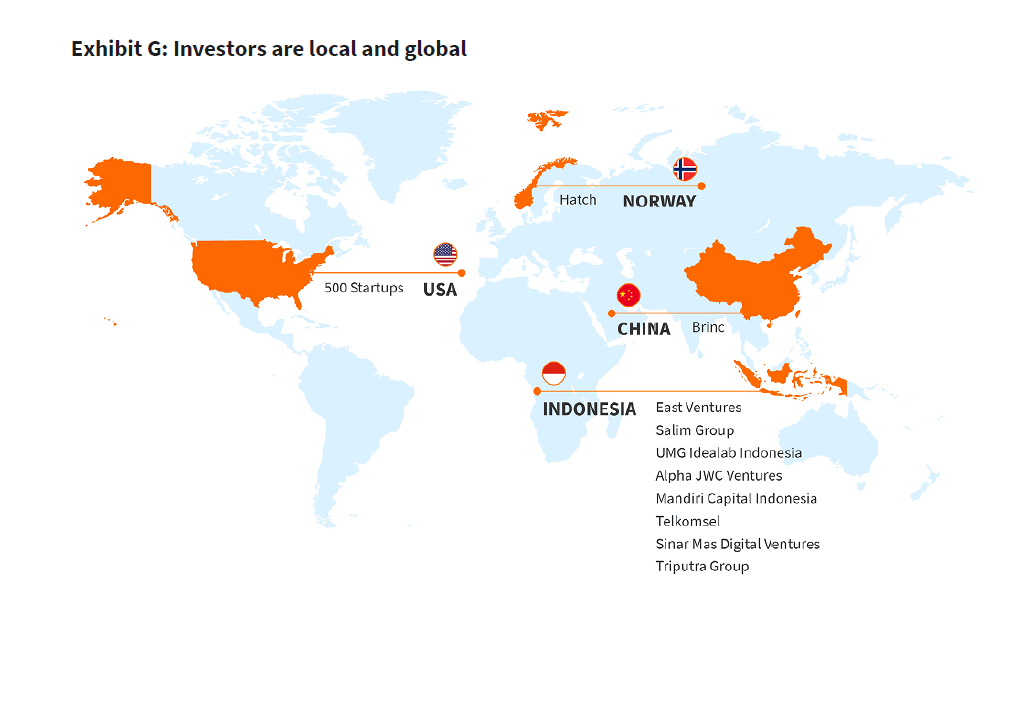Three Indonesian Agritech Records During the First Quarter of 2020
Summarizing the CompassList report titled “Indonesia Agritech Report 2020”
Agritech is an important industry segment because it is closely related to Indonesia. Agriculture takes up almost a third of land and labor use. The existence of technology is urgently needed to help this industry to have good productivity because the number of workers has continued to decline over the last decade.
Otherwise, the country will have to import more to feed itself. In 2025, it is predicted that Indonesia's population will increase by 11 million people from the current position of around 270 million people.
Quoting from a report compiled by the research institute CompassList entitled "Indonesia Agritech Report 2020Released at the end of March, the world is currently grappling with the threat of a food crisis due to the Covid-19 pandemic. Global food supply chains have become strained as more and more countries shut down and halt food exports.
Most businesses have also been suspended as life continues, amid efforts to contain the spread of the virus. This condition shows the importance of maintaining food security – and national agriculture.
This report shows high optimism for agritech, although it is still relatively new in Indonesia. Series A funding raised Chilibeli in March 2020, became a clear example that this sector has a bright path in the future. Chilibeli itself has just been released less than a year.
“More efficient and equitable agricultural practices will pave the way for sustainable agriculture in Indonesia, benefiting farmers, resources and communities. This helps create a stronger agricultural sector, which in turn will support Indonesia's food security and economic growth,” the report said.
Need more innovation deep tech
CompassList explains that currently operating agritech startups are divided into four types. Namely, about financing. E-commerce, education and assistance, and technology development. Sequentially, as well as showing the highest concentration of agritech startups.
Investment & Venture Partner UMG Idealab Jefry Pratama explained that the activity of selling agricultural commodities is the simplest and surest way for agritech startups to earn income. Of all the startups highlighted, they take advantage of their presence E-commerce or market it online offline.
Startups playing in deep tech so far leveraging AI, data analytics and robotics. Nothing has arrived yet deep tech (new technologies that offer significant advances over those currently in use), such as genetic engineering.

Startups that play in technology development include Habibi Garden, BIOPS, HARA, and JALA. Each has a technology specialization in data collection, farmers can translate into everyday language and can take immediate action.
JALA, for example, uses a series of sensors to detect water quality in shrimp pond ponds, salinity, and acidity to oxygen content. Data is sent to media-based analysis cloud which then provides suggestions for improving water quality.
Shrimp farmers may end up distributing less feed if there is excess feed as this impacts the final quality. They can reduce shrimp wastage and loss, increasing crop yields.
There is still a lack of innovation deep tech, actually occurs due to various factors. Starting from the lack of talent availability, support from campuses, research institutions, large corporations. These entities have an important role in shouldering development (R&D) costs for a particular sector. This is where most likely the first time the innovation was discovered.
However, this issue can be overcome, as done by UMG Idealab, the incubator and CVC of the conglomerate from Myanmar UMG. They invested in PT Mitra Sejahtera Pembangunan Bangsa (MSMB), an agritech startup focused on creating sensors, drones, and mobile applications for farmers.
Uniquely, MSMB was founded by lecturers and students from UGM. Its staff consists of students, recent graduates, and lecturers from local campuses in Yogyakarta and its surroundings.
Other factors are also reflected in the supporting infrastructure such as logistics and supply chain leaders. India is a comparison that is more or less the same as Indonesia, although it cannot be generalized. Both are countries with large areas with infrastructure development still lagging in the countryside.
The existence of R&D is increasingly needed
The existence of an R&D center for a business is very important, not only for agritech. To encourage more local farmers to increase their yields and reduce potential losses, more production of high-quality seeds is needed, development of better disease diagnosis tools, and new hardware.
Startups most likely don't have the big resources to make their own R&D, so that becomes a barrier to entry.deep biotechin seed development. They will take advantage of collaboration with local universities, such as IPB and UGM. The campus is equipped with the expertise and facilities to pursue crossbreeding, genetic engineering and other basic science projects.
Unfortunately, in this country there is still a lack of funds to build R&D. In 2018, the overall R&D budget was IDR 25,8 trillion or 0,2% of total GDP.

This condition encourages each stakeholder to collaborate with each other to create superior seed varieties. Many multinational companies are supported financially through collaboration with local players and the central government, as well as with their own budgets. Collaboration like this can accelerate the discovery of seed development that suits local needs and conditions, such as varieties that are more resistant to drought.
“The government can play a more active role in developing Indonesian agriculture to be more resilient. We need to fund R&D in Indonesia,” added the Co-Founder & President TaniGroup Partner of Wineka.
Initiatives to accelerate logistics are increasingly diverse
The Food and Agriculture Organization of the United Nations (FAO) estimates that as much as 120 kg to 170 kg of food per capita is lost or wasted each year in South and Southeast Asia. This is a homework for Indonesia to improve logistics and supply chain infrastructure to prevent food loss.
Statistics from ADB attribute 25%-45% of this spoilage to poor packaging, inadequate cooling systems, and long delivery times.
More Coverage:
Here, the role of the government and the private sector is needed to reduce post-harvest losses. The way to do this is to build warehouses, packing areas, coolers close to agricultural and fishery fields. Food delivery vehicles should also be upgraded through better road conditions and temperature-adjusting vehicles.
TaniGroup created a special logistics subsidiary, TaniSupply, in September 2019 to address inequality in the supply chain. Then, 8villages worked with agricultural intermediaries to create VLOGS, collecting data about logistics providers on the platform to help farmers find logistics partners.
If small farmers from neighboring villages can agree on the same logistics provider, for example, they can increase their bargaining power by collectively asking for lower shipping rates.
Tokopedia also made a similar initiative by creating a TokoCabang, a smart warehouse that can predict which items are selling the best in the nearest city. All traders, even micro, can place their stock in the warehouse based on the predicted buying trend.
This model can be adopted for agricultural products because farmers and fishermen have more or less the same challenges as online merchants at Tokopedia.
Simplifying transportation modes and supply chains will inevitably lead to reduced post-harvest losses. It takes vigorous initiatives from startups and the government to strengthen local food, enabling fresh products to be more easily accessible to consumers without interfering middlemen.
Sign up for our
newsletter
